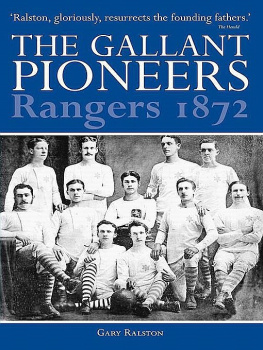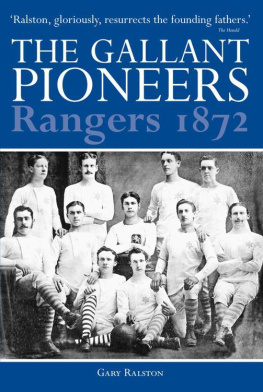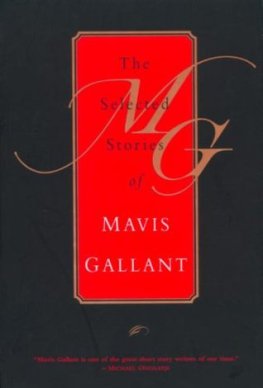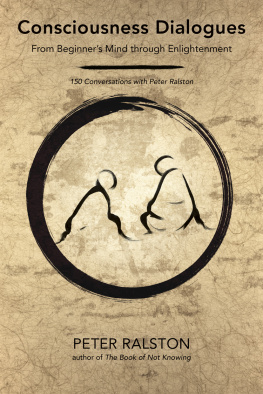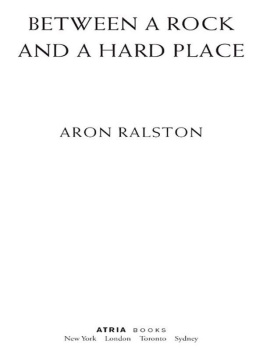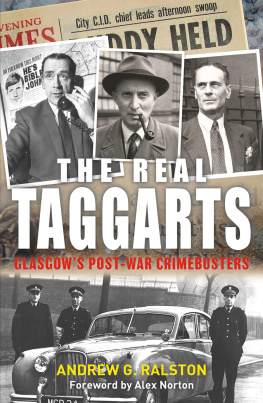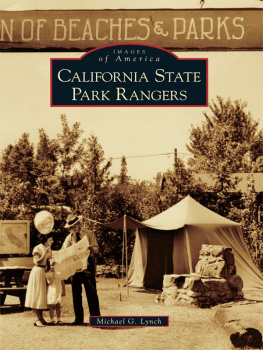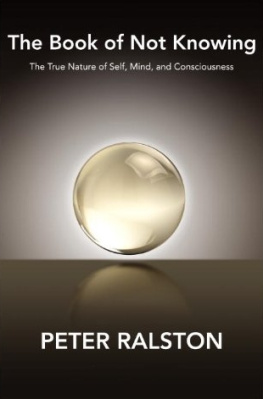Gary Ralston - The Gallant Pioneers: Rangers 1872
Here you can read online Gary Ralston - The Gallant Pioneers: Rangers 1872 full text of the book (entire story) in english for free. Download pdf and epub, get meaning, cover and reviews about this ebook. year: 2010, publisher: Derby Books Publishing Company Ltd, genre: Detective and thriller. Description of the work, (preface) as well as reviews are available. Best literature library LitArk.com created for fans of good reading and offers a wide selection of genres:
Romance novel
Science fiction
Adventure
Detective
Science
History
Home and family
Prose
Art
Politics
Computer
Non-fiction
Religion
Business
Children
Humor
Choose a favorite category and find really read worthwhile books. Enjoy immersion in the world of imagination, feel the emotions of the characters or learn something new for yourself, make an fascinating discovery.
- Book:The Gallant Pioneers: Rangers 1872
- Author:
- Publisher:Derby Books Publishing Company Ltd
- Genre:
- Year:2010
- Rating:3 / 5
- Favourites:Add to favourites
- Your mark:
- 60
- 1
- 2
- 3
- 4
- 5
The Gallant Pioneers: Rangers 1872: summary, description and annotation
We offer to read an annotation, description, summary or preface (depends on what the author of the book "The Gallant Pioneers: Rangers 1872" wrote himself). If you haven't found the necessary information about the book — write in the comments, we will try to find it.
The Gallant Pioneers: Rangers 1872 — read online for free the complete book (whole text) full work
Below is the text of the book, divided by pages. System saving the place of the last page read, allows you to conveniently read the book "The Gallant Pioneers: Rangers 1872" online for free, without having to search again every time where you left off. Put a bookmark, and you can go to the page where you finished reading at any time.
Font size:
Interval:
Bookmark:
The Gallant Pioneers
Rangers 1872
Gary Ralston
Ralston, gloriously, resurrects the founding fathers.
The Herald
Rangers are one of the most famous teams in world football, but what became of the teenagers who formed the club?
In the spring of 1872 four young men gathered in a park in the west end of Glasgow and decided to establish a side that would do justice to the new craze of association football. William McBeath and Peter Campbell were just 15 years old, Moses McNeil was 16 and his brother Peter was the oldest at 17. Soon they were joined by Tom Vallance, another 16-year-old, who quickly became skipper of the fledgling club.
None of those gallant pioneers was a native of Glasgow and yet within five years they were Scottish Cup finalists, were set up in their spiritual home on the south side of the burgeoning industrial city and attracting a working-class audience they have never lost.
Rangers may have scaled great heights since those early days but, sadly, the personal lives of almost all the founding fathers were touched by terrible tragedy.
Journalist Gary Ralston has used fresh research and hitherto unseen documents, records and transcripts to sympathetically recount the heartbreaking stories behind the men who created a great club. He reveals the tales of death through insanity, a drowning that denied a birthright as a steamship entrepreneur and the sad passing of a pioneer who lies buried in a paupers grave on the fringes of an English cemetery, cast as a certified imbecile, tried as a fraudster and left to live out his life in the poorhouse.
This fascinating insight into the earliest years of Rangers the first in-depth analysis for almost a century outlines the weight of evidence that suggests the club was formed in 1872, not 1873 as many fans believe.
It also tells of happier times, the links with royalty and football aristocracy and the clubs relationship with the city in which it was born in the tumultuous Victorian era. It recalls the memorable matches and political intrigues and examines the personalities who have helped to shape one of the most successful clubs in the game. It also traces the only two known surviving grandchildren of the founders in the 21st century and reveals how they knew nothing about their grandfathers most famous achievement.
Rangers 1872: The Gallant Pioneers tells one of footballs most romantic tales and also one of its saddest.
Gary Ralston works at the Daily Record in Glasgow as a sports reporter. He has covered the Beijing Olympics, World Cup Final, Champions League Final, Six Nations and Super Bowl.
A journalist for 20 years, he has reported extensively on Scottish football at home and abroad at club and international level for papers including the Daily Express and The Sun.
He began his full-time career at the Rangers News, the official club publication. He lives in Stirling with his wife Laura, son Lewis and daughter Jennifer.
First published in Great Britain in 2009 by The Breedon Books Publishing Company Limited, 3 The Parker Centre, Derby, DE21 4SZ.
2nd edition published in Great Britain in 2010 by The Derby Books Publishing Company Limited, 3 The Parker Centre, Derby, DE21 4SZ.
Kindle Edition published 2010.
Gary Ralston, 2010
All Rights Reserved. No part of this publication may be reproduced, stored in a retrieval system, or transmitted in any form, or by any means, electronic, mechanical, photocopying, recording or otherwise without the prior permission in writing of the copyright holders, nor be otherwise circulated in any form or binding or cover other than in which it is published and without a similar condition being imposed on the -subsequent publisher.
ISBN 978-1-85983-881-5
Dedication
For Laura, Lewis and Jennifer and the descendants of William McBeath, wherever they may be.
Contents
Appendix
Foreword
Ive had my share of pastime, and Ive done my share of toil,
And life is short the longest life a span;
I care not now to tarry for the corn or for the oil,
Or for wine that maketh glad the heart of man.
For good undone, and gifts misspent, and resolutions vain,
Tis somewhat late to trouble. This I know
I should live the same life over, if I had to live again;
And the chances are I go where most men go.
The Sick Stockrider
by Adam Lindsay Gordon, 18331870.
The above verse by the Australian poet was read by Tom Vallance on the evening of Wednesday 13 April 1898 at his restaurant, The Metropolitan, in Hutchison Street, Glasgow. The occasion was the 21st anniversary of the 1877 Scottish Cup Final between Rangers and Vale of Leven and 30 former players and friends of both clubs accepted the invite from the first great captain of the Light Blues to attend.
He told his guests: The same spirit that characterised football in the old days has gone. It has been reduced to a purely mercenary matter.
* * * * *
Our very success, gained you will agree by skill, will draw more people than ever to see it. And that will benefit many more clubs than Rangers. Let the others come after us. We welcome the chase. It is healthy for us. We will never hide from it. Never fear, inevitably we shall have our years of failure, and when they arrive, we must reveal tolerance and sanity. No matter the days of anxiety that come our way, we shall emerge stronger because of the trials to be overcome. That has been the philosophy of the Rangers since the days of the gallant pioneers.
Bill Struth
Acknowledgements
This book has been in the planning, research and writing stages for almost three years, and it has not only been the impetus to tell a great story that has maintained enthusiasm, but also the support of countless individuals. It goes without saying that this is not an end, but hopefully a beginning for others to research and write still further on the early years of Rangers, especially as archives open up and records become even more easily accessible.
Firstly, my thanks go to Rangers historian David Mason, who offered wise counsel from the outset and whose own research efforts, particularly in relation to Tom Vallance and the whereabouts of William McBeath, were much appreciated. Rangers early history is a passion we both share and while there were times when we competed for the same ball, we always shared the same goal.
The staff at the Scottish Football Museum at Hampden, particularly curator Richard McBrearty, Kenny Strang and Tommy Malcolm, also deserve enormous credit. Kenny and Tommy, in particular, have been a rich source of anecdotes, historical data, quotes and photographs. In another life Kenny taught me how to drive and his patience now is as impressive as it was back then. I particularly appreciated his willingness to take a three-point turn out of bed on a Saturday morning to open up the Hampden vaults for another of my queries and quibbles in his personal time. Robert McElroy, author of the excellent Rangers Historian, has provided kind advice, not to mention generous access to his own archives. Colleagues in the Scottish press have provided a sympathetic ear and encouraging support; these include Stephen Halliday, Gary Keown, Rodger Baillie, Jim Traynor, Iain Scott, David Leggat, Drew Allan, Mark McGivern and Alan Pattullo. Thanks also to Alan Hamilton and Donald Leary at Record pictures and Kevin Mansi and Andy Lines on news.
The people of the Gareloch have freely given of their time and knowledge, especially Alistair McIntyre, Richard Reeve, Robert McIntyre, Mike Davis at Helensburgh Library and the staff of the Helensburgh Advertiser. At Hearts, thanks go to Bill Robertson and David Speed, while at Hibs thanks to Tom Wright. Acknowledgements also go to Brian McAusland at Clydesdale Harriers, Jack Murray, Andy Mitchell, David Thompson of the Scottish Football League, Jane McNeil, Derek and Bev Perry, Alistair Tough, Gordon Urquhart, William Wernham, David Williamson at the Scottish Whisky Association, Stuart Hendry at Glengoyne and Kathleen Brown, Ken Dunn and the Callander Heritage Society, John Howard at Canwick Road Cemetery in Lincoln, Gordon Wilson of Glasgow Accies and Mike Stanger at Clydesdale Cricket Club. There is also a passionate community of Rangers historians out there and enormous thanks to Iain McColl, Gordon Bell, Gordon McGilvray, Stevie Tyrie, John McKnight, Gordon Semple, Suzi Murray and Alergy for the generous and unselfish way they were prepared to freely offer up their own findings, photographs and research efforts. Thanks to Susan Rees, Val Hedges, Brian Clements, Peter Higginbotham, Stanley Matthews, Graham Hopner, Andrew Roberts, Geoff Everitt, Lorraine MacKenzie, Andy Kyle, Glyn Barrett, Gordon Stewart, Elma Lindsay, Peter Gilmour and Paul Rowland at The Indiaman magazine and the online community at Rootschat. Wray Vamplew, Adrian Harvey, Matthew Taylor and Tony Collins kindly gave of their own knowledge, as did John Gildea at Clyde Rowing Club, John Bowie and Owen McGhee at Clydesdale and George Parsonage of the Glasgow Humane Society.
Font size:
Interval:
Bookmark:
Similar books «The Gallant Pioneers: Rangers 1872»
Look at similar books to The Gallant Pioneers: Rangers 1872. We have selected literature similar in name and meaning in the hope of providing readers with more options to find new, interesting, not yet read works.
Discussion, reviews of the book The Gallant Pioneers: Rangers 1872 and just readers' own opinions. Leave your comments, write what you think about the work, its meaning or the main characters. Specify what exactly you liked and what you didn't like, and why you think so.

